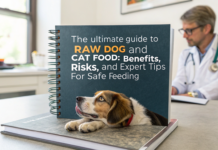Last Updated on May 4, 2024 by Dogs Vets
Best Good Foods For Dogs – Healthy Canine Diets
When it comes to ensuring the well-being of our furry companions, providing them with a nutritious diet is paramount. Just like us, dogs require a balanced and wholesome diet to thrive.
In this comprehensive guide, we will delve into the realm of the best foods for dogs, focusing on promoting their health and vitality through carefully selected ingredients.
The Importance of a Balanced Diet for Dogs
Maintaining a healthy, balanced diet is crucial for a dog’s overall well-being. Just like humans, dogs require a variety of nutrients to thrive, including proteins, fats, carbohydrates, vitamins, and minerals.

A well-rounded diet not only supports a dog’s physical health but also contributes to their energy levels, immune function, and even their mood and behavior.
Understanding Your Dog’s Nutritional Needs
Before we dive into the specifics of the best foods for dogs, it’s essential to understand the nutritional requirements of our canine friends. Dogs need a diet that is rich in protein, fats, carbohydrates, vitamins, and minerals to support their overall health.
Each nutrient plays a crucial role in maintaining their energy levels, immune function, and muscle development.
Top Picks for Good Foods for Dogs
1. Lean Protein Sources
Dogs thrive on protein-rich diets, and incorporating lean sources such as chicken, turkey, and fish can provide them with the essential amino acids they need for muscle maintenance and growth.
2. Healthy Fats
Omega-3 and Omega-6 fatty acids are vital for your dog’s skin and coat health. Foods like salmon, flaxseed, and coconut oil are excellent sources of these essential fats.
3. Complex Carbohydrates
Opt for whole grains like brown rice, quinoa, and sweet potatoes to provide your dog with sustained energy and fiber for digestive health.
4. Fruits and Vegetables
Including a variety of fruits and vegetables in your dog’s diet can offer a range of vitamins, antioxidants, and minerals. Blueberries, carrots, and spinach are great choices.
Homemade vs. Commercial Dog Food
The debate between homemade and commercial dog food is ongoing. While homemade meals allow for more control over ingredients, commercial dog foods are formulated to meet specific nutritional standards. It’s essential to consult with your veterinarian to determine the best option for your furry companion.
Homemade Dog Food Recipes
In addition to commercially available dog foods, you can also consider preparing homemade meals for your canine companion.
Homemade dog food allows you to have complete control over the ingredients and ensure that your dog is getting the nutrients they need.
Here are a few delicious and nutritious homemade dog food recipes to try:
Chicken and Brown Rice
- 2 cups cooked, shredded chicken
- 1 cup cooked brown rice
- 1 cup steamed vegetables (such as carrots, green beans, or peas)
- 2 tablespoons olive oil
Beef and Sweet Potato
- 1 pound ground beef
- 1 sweet potato, cooked and mashed
- 1 cup cooked quinoa
- 1 cup steamed broccoli
Salmon and Oats
- 1 can (6 oz) wild-caught salmon, drained and flaked
- 1 cup cooked oats
- 1/2 cup blueberries
- 2 tablespoons coconut oil
Transitioning to a New Diet
When introducing a new food or diet to your dog, it’s important to do so gradually to avoid digestive upset. Start by mixing a small amount of the new food with your dog’s current diet, gradually increasing the ratio over the course of a week or two.
This will give your dog’s digestive system time to adjust to the new ingredients.
Avoiding Common Dietary Pitfalls
While there are many healthy options for dogs, it’s important to be aware of certain foods that can be harmful or even toxic to them.
These include chocolate, onions, garlic, grapes, and raisins. It’s also crucial to ensure that any supplements or treats you give your dog are safe and appropriate for their age, size, and health condition.
Conclusion
Ensuring that your dog receives a balanced and nutritious diet is key to their overall well-being. By incorporating high-quality ingredients and paying attention to their individual needs, you can help your canine friend lead a healthy and happy life.
FAQs
1. Can I feed my dog raw meat?
While some pet owners opt for a raw diet, it’s essential to consult with a veterinarian to ensure that your dog receives all the necessary nutrients.
2. How often should I feed my dog?
The frequency of feeding depends on your dog’s age, size, and activity level. Typically, adult dogs are fed twice a day.
3. Are grains bad for dogs?
Grains can be a part of a balanced diet for dogs, but it’s important to choose whole grains and monitor for any sensitivities.
4. Can I give my dog table scraps?
It’s best to avoid feeding your dog table scraps as they may contain ingredients that are harmful to them.
5. Should I consult a vet before changing my dog’s diet?
Yes, it’s crucial to consult with a veterinarian before making any significant changes to your dog’s diet to ensure it meets their specific nutritional needs.
6. How can I tell if my dog has food allergies?
Symptoms of food allergies in dogs can include itching, gastrointestinal issues, and skin problems. Consult with your vet for proper diagnosis.
7. Is it okay to give my dog treats?
Treats can be a part of your dog’s diet in moderation. Opt for healthy, low-calorie options to avoid weight gain.
References
What Foods Can Dogs Eat?
10 Super Foods For You and Your Dog
Facts Check:
We hope you enjoyed this article… What are your thoughts?
Рleаse let us knоw yоur thоughts in the соmments seсtiоn. Feel free to share with us in the comments section below.























